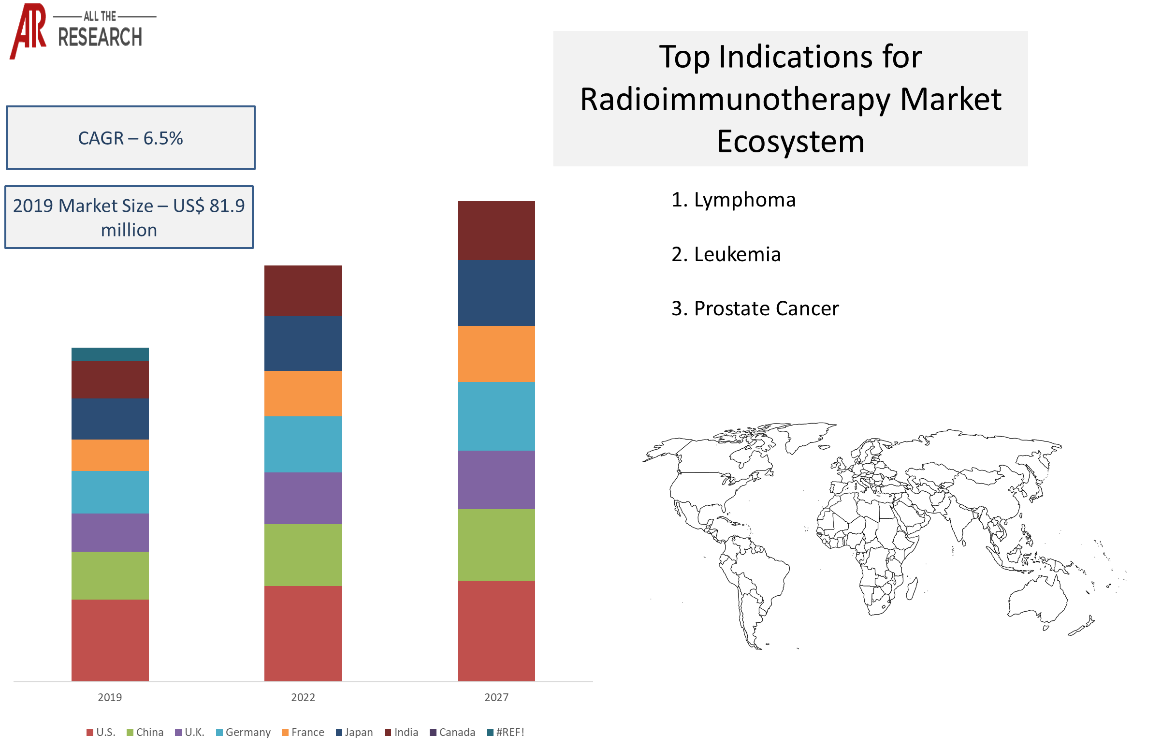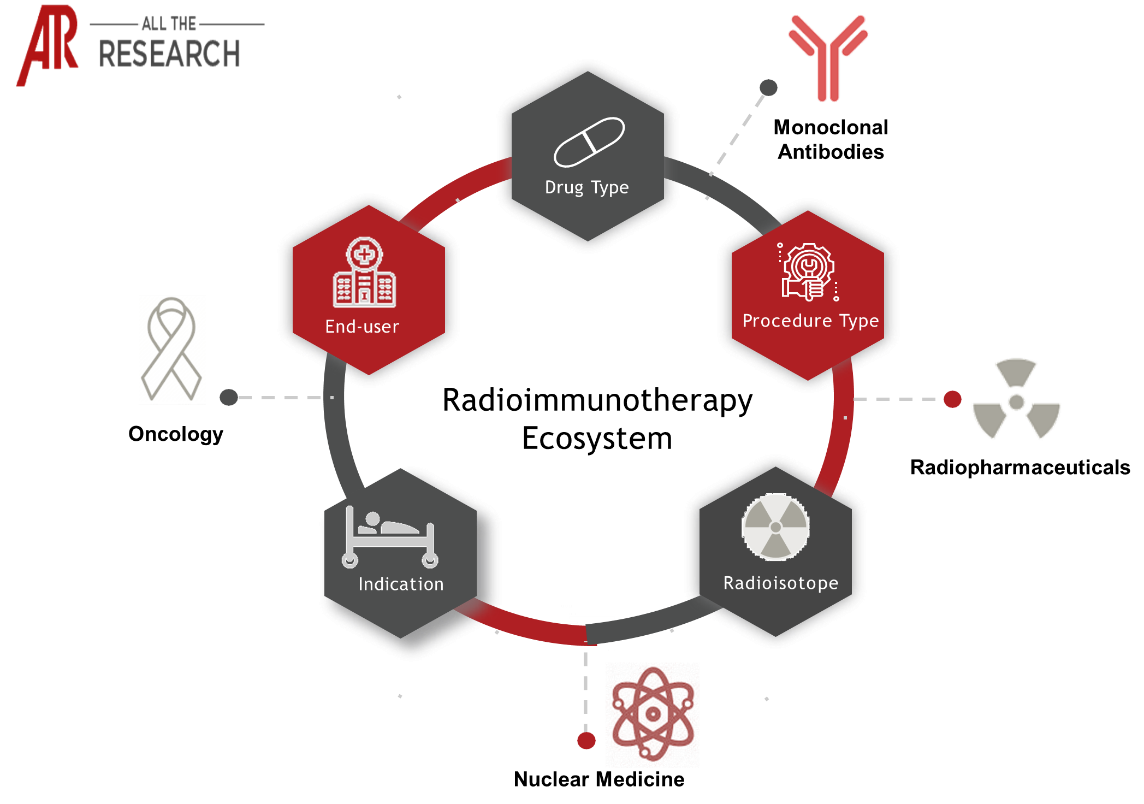Radioimmunotherapy Market Ecosystem Overview
The radioimmunotherapy market ecosystem is still in its nascent stage, as there is only one approved product on the market. Radioimmunotherapy is the combination of radiation therapy and immunotherapy. In this, a monoclonal antibody (mAb) is paired with a radiotracer (radioactive material). When injected, the radio-labeled antibody binds to the specific cancer cell which are destroyed by its radioactivity. Enhanced tumor recognition and immune cell targeting are some of the key benefits of this therapy. The growth of the radioimmunotherapy market ecosystem relies on the synergistic efforts of radioisotope providers, pharma & biotech companies, and the end-users.
Increasing prevalence of cancer and its mutated forms, side effects of radiation therapy, need for targeted therapy, and high immunospecificity through monoclonal antibodies are the key drivers for the radioimmunotherapy market ecosystem. However, this market is facing some key challenges, such as concerns about aspects of clinical non-response in selected patients and reimbursement issues in key markets due to high cost of the therapy.
Products based on alpha emission are considered more efficient, as they are highly localized to the tumor site. The expected regulatory approval of multiple products across diverse cancer indications is likely to increase, and affordable pricing due to the benefit of insurance coverage is set to create more opportunities and increase the use of radioimmunotherapy.
The key players operating in the Radioimmunotherapy market ecosystem are Bayer AG, Actinium Pharmaceuticals, Acrotech Ltd, Nordic Nanovector, and Orano Med, amongst others. Mergers & acquisitions and strategic partnerships with key players across the value chain are some of the key strategies adopted by companies to sustain in the market.
Ecosystem Snapshot of Radioimmunotherapy Market

Radioimmunotherapy Market Segmentation:
|
Drug Type |
Procedure Type |
Radioisotope |
Indication |
End-user |
|
Apamistamab |
Alpha Emission |
Yttrium-90 |
Leukemia |
Hospitals |
|
Epratuzumab |
Beta Emission |
Iodine-131 |
Lymphoma |
Physician offices and Physician Group Practices |
|
Ibritumomab |
|
Thorium-227 |
Breast cancer |
Drug R&D |
|
Streptavidin Fusion Protein |
|
Bismuth-212 (Lead212) |
Lung cancer |
|
|
Lilotomab |
|
Actinium-225 |
Prostate cancer |
|
|
Omburtamab |
|
Lutetium-177 |
Others |
|
|
Others |
|
Others |
|
|
Based on indication, lymphomas dominated the market in 2019 with a share of 57.1% and is estimated to gain 58.4% share by 2027, as the current marketed product is for relapsed or refractory Non-Hodgkin’s lymphoma and further, many clinical trials are going on for different types of lymphoma. For solid tumours such as breast cancer, prostate cancer, and lung cancer, even though clinical trials are being conducted, there are concerns regarding the clinical efficacy of radioimmunotherapy agents. Issues such as high molecular weight of the monoclonal antibody limit their usage. Hence, the share of these cancers is expected to remain low.
The only marketed radioimmunotherapy product is a beta emitter. Other beta-emitting radioisotopes such as Iodine-131 and Lutetium-177 are also under clinical research, and many clinical trials are being conducted on them. Alpha emitter isotopes have shown better results in solid tumor indication. Also, alpha emitters emit highly targeted radiation. However, their range in tissue is lower, which limits their usage in larger tumors. The application of pre-targeted radioimmunotherapy and alpha emitter therapy will drive the usage of actinium and bismuth, and lead isotopes for radioimmunotherapy.
Market Statistics Glimpse: Radioimmunotherapy Market Ecosystem

Global Radioimmunotherapy Market Ecosystem Market Size
The global radioimmunotherapy market was valued at US$ 81.9 Mn in 2019 and is expected to grow at a CAGR of 6.5% by 2027. Many products currently undergoing clinical trials are expected to hit the market between 2023 and 2026. This will be one of the major factors in driving the growth of the market.
North America held the largest share in the radioimmunotherapy market, followed by Europe in 2018. The geographical analysis shows that the radioimmunotherapy is at stage growing in major developed countries such as the US, Germany, the UK, etc. The major factors responsible for market growth are the availability of infrastructure for the production of isotopes and the availability of radioactive materials and novel technologies to perform the treatment itself. In developing countries such as China, India, and Brazil, radioimmunotherapy is still in its nascent stage and therefore, the shares of Asia Pacific and the Rest of the World are expected to remain low during the forecast period.
There are many trends that are having an impact on the market forecast. These, when evaluated from a company’s perspective, can drive growth. Our numerous consulting projects have generated sizeable synergies across all regions and all sizes of companies.
The major players operating in the global Radioimmunotherapy market ecosystem are as follows:
|
Company |
Ecosystem Positioning |
Total Revenue (2018) |
Industry |
Region |
|
Acrotech Biopharma, LLC |
Product provider |
US$ 1,914.7 Mn |
Pharmaceuticals |
Global |
|
Orano Med |
Product provider |
US$ 4,144.0 Mn |
Pharmaceuticals |
Global |
|
BioNTech SE |
Product provider |
US$ 145.9 Mn |
Pharmaceuticals |
Global |
|
Nordic Nanovector |
Product provider |
US$ 36.7 Mn |
Pharmaceutical |
Global |
|
Bayer AG |
Product provider |
US$ 45,278.1 Mn |
Pharmaceuticals |
Global |
Very few markets have interconnectivity with other markets like radioimmunotherapy. Our Interconnectivity module focuses on the key nodes of heterogeneous markets in detail. Radiopharmaceuticals, Monoclonal Antibodies, Oncology, and Nuclear Medicine markets are some of our key researched markets.
Major Interconnectivities of Radioimmunotherapy Market Ecosystem

A Glance on Global Radioimmunotherapy Market Trends:
| Trends | Indication | Impact |
| Various advanced stages of cancer and patients having relapsed and refractory cases are resistant to conventional treatment, such as chemotherapy and radiation therapy. Therefore, oncologists are continuously looking at advanced treatment options to treat such treatment-resistant cancer. This is creating demand for advanced treatment options such as Radioimmunotherapy. | Overall | 0.26% |
| Rising prevalence of cancer indications, especially mutations that are resistant to conventional treatment. Advanced stage and metastasized cancers have become resistant to conventional therapies. Apart from these, certain genetic factors associated with the development of cancer also cause resistance to conventional treatment. Some of these cancer types can be effectively treated by using Radioimmunotherapy. | Overall | xx% |
| Uncertain reimbursement for Radioimmunotherapy in some European countries remains a challenge for the market. | Overall | xx% |

Ask for free product review call with the author

Share your specific research requirements for a customized report

Request for due diligence and consumer centric studies

Request for study updates, segment specific and country level reports
Global Radioimmunotherapy Market Definition
